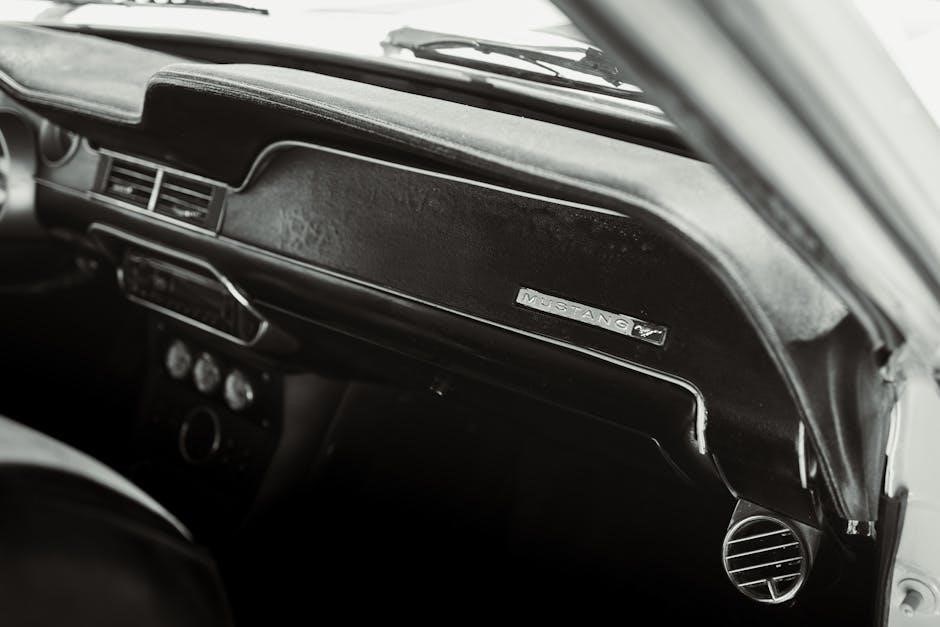A car purchase contract is a legal document formalizing the sale of a vehicle between a buyer and seller, detailing terms, conditions, and responsibilities for both parties.
1.1. Definition and Purpose of the Contract
A car purchase contract is a legally binding agreement between a buyer and seller, outlining the terms of the vehicle’s sale. Its purpose is to protect both parties by clearly defining the vehicle’s details, payment terms, and responsibilities, ensuring a smooth and transparent transaction.
1.2. Importance of a Written Agreement in Vehicle Transactions
A written agreement in vehicle transactions provides clarity and legal protection for both buyers and sellers. It minimizes disputes by documenting all terms, ensuring transparency and accountability. A formal contract is essential for enforcing rights and obligations, offering a reliable record of the sale.
Key Elements of a Car Purchase Contract
A car purchase contract includes vehicle details, payment terms, buyer and seller information, and signatures, ensuring a clear and legally binding agreement.
2.1. Vehicle Description (Make, Model, Year, Mileage, etc.)
The vehicle description is a crucial part of the contract, detailing the make, model, year, mileage, and Vehicle Identification Number (VIN). This ensures clarity and prevents disputes, accurately representing the car’s condition and specifications. Including precise details helps protect both the buyer and seller, ensuring transparency in the transaction and maintaining trust. Proper documentation is essential for a smooth process.
2.2. Payment Terms and Conditions
The payment terms outline the total purchase price, payment methods, and due dates, ensuring clarity for both parties. It specifies whether the payment is made in full or installments, including deposit amounts and refund conditions. This section also details penalties for late payments, ensuring transparency and accountability. Clear payment terms prevent disputes and ensure a smooth transaction process for all involved parties.
2.3. Buyer and Seller Information
This section outlines the buyer’s and seller’s personal details, ensuring accountability and contract enforcement. It includes full names, identification documents, addresses, and contact information. Accurate identification of both parties is crucial for the contract’s validity and helps prevent future disputes. This information is fundamental for maintaining transparency and ensuring all parties are legally bound, protecting their rights throughout the transaction.
Legal Requirements for a Valid Contract
A valid car purchase contract must be notarized and include witness signatures to ensure authenticity. Compliance with local laws and regulations is essential to uphold its legality.
3.1. Notarization and Witness Signatures
Notarization ensures the contract’s authenticity, verifying the identities and signatures of both parties. Witness signatures add credibility, confirming the agreement was entered voluntarily. Both steps are crucial for the contract’s legality and enforceability.
3.2. Compliance with Local Laws and Regulations
Adherence to local laws ensures the contract’s validity and prevents legal disputes. Requirements may include vehicle inspections, title transfers, and tax payments. Compliance guarantees a smooth transaction and protects both parties’ rights under the jurisdiction’s legal framework.

Obligations of the Buyer and Seller
Obligations are mutual, with sellers delivering the vehicle and transferring ownership, while buyers must complete payments and inspect the car to ensure it meets agreed conditions.
4.1. Seller’s Responsibilities (Vehicle Delivery, Title Transfer)
The seller must deliver the vehicle in the agreed condition, free from liens or debts, and transfer the title to the buyer. They are responsible for providing all necessary documentation, ensuring the car is legally transferable, and completing the sale as stipulated in the contract.
4.2. Buyer’s Responsibilities (Payment, Inspection)
The buyer must pay the agreed amount as per the contract terms and conduct a thorough inspection of the vehicle. They are responsible for verifying the car’s condition, mileage, and documentation. The buyer must also ensure all payments are made on time and confirm the transfer of ownership is legally completed.

How to Create a Car Purchase Contract
Use a template or sample contract to draft the agreement, ensuring all details like vehicle description, payment terms, and signatures are included for a legally binding document.
5.1. Using Templates or Sample Contracts
Using templates or sample contracts simplifies the process, ensuring clarity and thoroughness. Templates typically include sections for vehicle details, payment terms, and signatures. They serve as a guide, reducing errors and omissions. Many templates are available online in PDF format, providing a professional and legally sound framework for the agreement. This approach saves time and ensures compliance with legal requirements.
5.2. Converting the Document to PDF Format
Converting the car purchase contract to PDF ensures a professional, tamper-proof document. PDFs are easily shared and stored, maintaining their format across devices. Many templates are already in PDF format, or you can convert Word documents using free tools. This format is ideal for legal agreements, as it prevents unauthorized edits and ensures clarity and security.
Common Mistakes to Avoid in a Car Purchase Contract
Common mistakes include omitting vehicle details, unclear payment terms, and missing seller warranties. Ensure all terms are clearly stated to avoid disputes and legal issues later.
6.1. Omissions in Vehicle Description
Omissions in vehicle description, such as make, model, year, mileage, or condition, can lead to disputes. Accurate details ensure clarity and prevent misunderstandings, protecting both buyer and seller legally.
6.2. Lack of Clarity in Payment Terms
Unclear payment terms, such as total price, payment methods, and due dates, can lead to misunderstandings. Specify whether the payment is in cash, installments, or financing. Include penalties for late payments to avoid disputes. Clear terms ensure both parties understand their obligations, preventing potential breaches of contract and ensuring a smooth transaction.

The Role of a Notary in the Contract
A notary authenticates signatures, ensuring both parties agree to the terms willingly. This verification adds legal validity to the contract, making it enforceable and protecting all involved parties.
7.1. Authentication of Signatures
The notary verifies the identities of both the buyer and seller, ensuring they sign the contract voluntarily. This authentication confirms the legitimacy of the agreement, making it legally binding and enforceable. The notary’s stamp or seal adds an official layer of verification, protecting both parties from potential disputes and ensuring the contract’s validity.
7.2. Ensuring the Contract’s Legality
The notary ensures the contract adheres to local laws and regulations, verifying the vehicle’s documentation and legal status. This includes checking for any liens, ensuring the seller’s ownership rights, and confirming the vehicle’s registration. The notary’s review guarantees the contract is legally sound, protecting both parties and ensuring a smooth transaction without legal complications or disputes.
Dispute Resolution and Contract Termination
Disputes are resolved through mediation or legal action. Contract termination occurs if either party breaches terms, such as failure to deliver the vehicle or non-payment.
8.1. Conditions for Contract Cancellation
A contract can be canceled if the seller fails to deliver the vehicle, the buyer defaults on payment, or either party breaches the agreed terms. Cancellation must be formally declared, often requiring mediation or legal intervention. Both parties should retain written records to support their claims and ensure a fair resolution process.
8.2. Mediation and Legal Remedies
Mediation is often the first step in resolving disputes, offering a cost-effective way to reach mutual agreements without court intervention. If unresolved, legal remedies such as arbitration or court proceedings may be pursued. Both parties can seek legal advice to enforce their rights, ensuring fair resolution and upholding the contract’s terms through formal legal channels.

Benefits of Using a PDF Format for the Contract
PDF format ensures easy sharing, storage, and tamper-proof documentation. It maintains a professional appearance and prevents unauthorized edits, making it a secure choice for legal agreements like car purchase contracts.
9.1. Easy Sharing and Storage
PDF formats allow seamless sharing via email or cloud storage, ensuring accessibility for all parties. They also enable efficient storage on devices or cloud platforms, maintaining organization and reducing physical clutter. This convenience makes PDFs ideal for managing legal documents like car purchase contracts, ensuring they are readily available when needed.
9.2. Tamper-Proof and Professional Appearance
PDF contracts are tamper-proof, ensuring the integrity of the agreement remains intact. They also present a polished, professional appearance, crucial for legal documents. This format helps maintain credibility and trust between buyers and sellers, making it a preferred choice for formal transactions like car purchases.
A well-structured car purchase contract is essential for protecting both parties’ interests, ensuring clarity, fairness, and smooth transactions. Using a PDF format ensures a professional appearance and secure, legally binding documentation, fostering trust and a successful outcome.
10.1. Final Thoughts on the Importance of a Well-Structured Contract
A well-structured car purchase contract ensures legal protection, clarity, and fairness for both buyer and seller. It protects rights, prevents disputes, and guarantees a smooth transaction. A clear, detailed agreement fosters trust and accountability, making it essential for a successful and stress-free vehicle purchase experience.
10.2. Recommendations for a Smooth Transaction
- Use a professional template to ensure all details are included and clear.
- Have the contract notarized to authenticate signatures and legality.
- Include precise payment terms, vehicle description, and delivery timelines.
- Conduct a thorough vehicle inspection before finalizing the agreement.
- Ensure both parties fully understand their obligations and rights.
